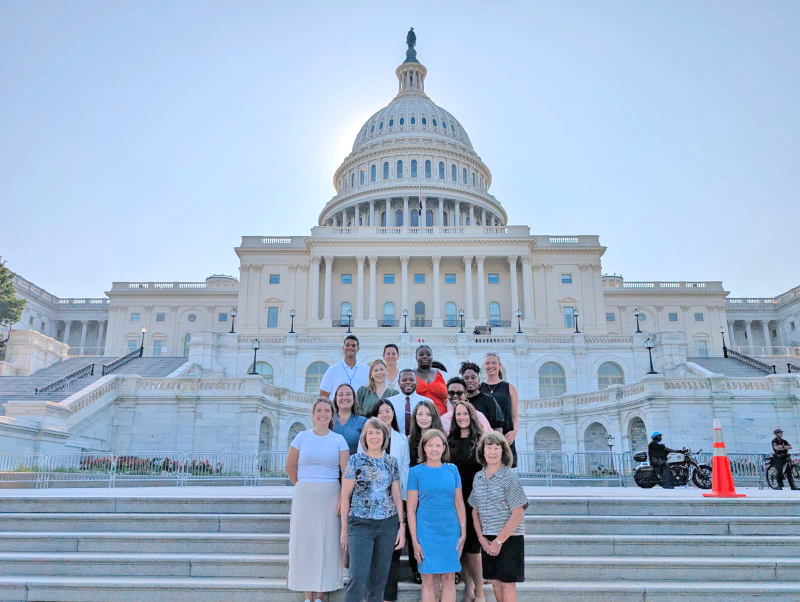SRCD Brings Youth Mental Health Experts to Congress in Inaugural Child Policy Connect Experience
Thirteen SRCD members with expertise in youth mental health research and practice joined SRCD’s Policy team for the inaugural Child Policy Connect Capitol Hill Day event.

SRCD Brings Members to Congress in First Child Policy Connect Experience
From July 29-31, 2025, thirteen SRCD members with expertise in youth mental health attended the inaugural Child Policy Connect event in Washington, DC.
These SRCD members met with Republicans and Democrats in 19 offices across the Senate and House to help bring evidence on child and adolescent mental health into the policy process. They also shared why social science matters and the impact of federal attacks on research grants and scientific communities.
"It was inspiring to get an understanding of how the system works. The way that SRCD structured it and the work to support this was phenomenal…I'm so excited to go back and talk to my students and energize them as well," said SRCD member Dr. Charissa Cheah.
Child Policy Connect – part of SRCD’s new Child Policy Hub – connects SRCD members and Congress to answer pressing policy questions. This unique program launched in 2024 to train and support SRCD members in forging relationships with policymakers to improve evidence-based policymaking. While in D.C., SRCD members also experience SRCD’s federal science advocacy work, promoting the importance of science research funding.
Researchers met with legislative staff to discuss how the child development evidence base can inform youth mental health policies on issues like rural access to mental health care, substance use, eating disorders, prosocial behavior, cuts to federal programs, and peer support programs. Legislative staff shared status updates on bills that tackled these issues, proposed ideas for informational briefings, and expressed enthusiasm in building on the burgeoning relationships with the attending researchers.
"It was eye opening to see how the system works. You see policy but you don't see the system behind it - the level of staffers behind it...how this policy comes into effect and how it impacts the work I do. To meet with them and have that connection to policymakers was inspiring,” reflected SRCD member Dr. Theda Rose.
At this fraught moment for science, several of the researchers also shared their stories of why social science matters and how recent grant cancellations have harmed our community. They did this with some of the most influential Senators with sway over scientific funding and legislation, including Sen. Collins (R-ME), Sens. Hawley and Schmitt (R-MO), Sen. Sanders (I-VT) and more.
“It was a great experience. I think we were successful in moving the minds of legislators toward support of research on child development. This was just a first step. I intend to carry this process through until our legislators have a deeper understanding of why their support is vital for research, and that research is vital for child well-being", stated member Dr. Christi Bergin.
Researchers were recruited and fully supported by SRCD throughout their experience. After SRCD policy staff screened congressional offices, they recruited researchers with relevant expertise from the Child Policy Connect community and the broader SRCD membership. Staff trained scholars and facilitated all meetings. Many scholars also received travel support from SRCD to attend.
“I'm shocked by how much I learned in three days. Now that I've experienced it, I see areas with opportunities for growth as I continue to grow my skillset when engaging with policymakers, said SRCD member and doctoral student Nikia Pinson.
All of this work was made possible with significant investments from SRCD’s Governing Council and the William T. Grant Foundation.
This experience marks the beginning of mutually beneficial collaborations between scholars and policymakers. Within days after the event, researchers created new fact sheets and policy briefs to support Congress’ needs.
SRCD’s Child Policy Hub is built on a theory of change that centers policymakers’ needs. By responding in real time to the questions policymakers are asking and drawing upon a wide body of literature in answering those questions, researchers can better promote evidence-based policymaking.
Child Policy Connect and Science Advocacy help scholars learn and put into practice two different ways to interact with policymakers – as an impartial, “honest broker” of evidence, and a scientific advocate.
All SRCD members are invited to be a part of this work. Join the Child Policy Connect community on SRCD’s Commons to answer policymakers’ questions both virtually and in D.C.